

Robot revolution: rise of 'thinking' machines could exacerbate inequality. A “robot revolution” will transform the global economy over the next 20 years, cutting the costs of doing business but exacerbating social inequality, as machines take over everything from caring for the elderly to flipping burgers, according to a new study.
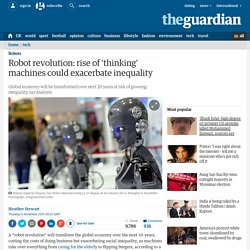
As well as robots performing manual jobs, such as hoovering the living room or assembling machine parts, the development of artificial intelligence means computers are increasingly able to “think”, performing analytical tasks once seen as requiring human judgment. In a 300-page report, revealed exclusively to the Guardian, analysts from investment bank Bank of America Merrill Lynch draw on the latest research to outline the impact of what they regard as a fourth industrial revolution, after steam, mass production and electronics.
“We are facing a paradigm shift which will change the way we live and work,” the authors say. Digital politics: are we trapped within our online filter bubbles? How did Labour get such a walloping the last UK general election when everyone you knew on Twitter was a #Milifan?
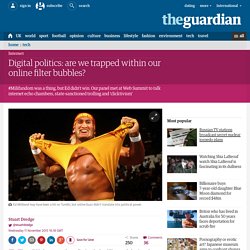
Or, alternatively, how could Ukip be such an electoral damp squib – in terms of seats, if not votes – when everyone you chatted to on Facebook was on Team Farage? The answer – and it’s not a new concept – is filter bubbles. As we spend more of our online lives on social networks where we’ve chosen the people we follow or friend, there’s a risk that our belief of what “everyone” thinks will be disproved when the real-world everyone goes to the polling stations. Or, as David Cameron put it in his last Conservative Party conference speech: “Let me put it as simply as I can: Britain and Twitter are not the same thing.” This, and a number of other topics around our digital engagement with politics, were discussed in a Guardian-moderated session at last week’s Web Summit conference. The dating gap: why the odds are stacked against female graduates. There were, says Cat, perhaps one or two male students on her English degree.
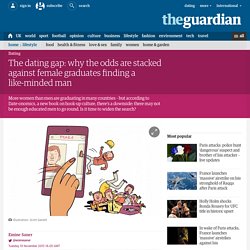
It was the same, she noticed, on her friends’ courses. “There were a lot of girls at my university,” she says. “You would look around tutorials or lectures and there would be one or two token guys.” While there are some degrees, particularly in science and engineering subjects, that are overwhelmingly filled with male students, the general trend in many countries is for more women to go to university than men. People transform themselves into cyborgs with Northstar V1 chip implants. A group of 'biohackers' in Germany has implanted LED lights under their skin.

The men each had a Northstar V1 chip - which is about the size of a large coin - implanted into their hands. The chip features a ring of LED lights and is designed to be able to light up tattoos from beneath the skin, emulating the bioluminescence of jellyfish. A group of 'biohackers' in Germany has implanted LED lights under their skin. The men each had a Northstar V1 chip - which is about the size of a large coin - implanted into their hands The 15 minute surgical procedure was offered by Pittsburgh-based Grindhouse Wetware which claims to use 'safe' technology to create cyborgs.
Microsoft's Emotion Recognition reveals how a person really feels in pictures. Free tool gives each face in a photo an 'emotion' score from zero to oneIt rates anger, contempt, disgust, fear, happiness, sadness and surpriseThe online software found Kate Middleton was elated on her wedding dayImage of Kim Kardashian with Kanye revealed she was 70 per cent happy By Ellie Zolfagharifard For Dailymail.com Published: 18:51 GMT, 11 November 2015 | Updated: 19:35 GMT, 11 November 2015 Earlier this year, Microsoft unveiled a viral tool that claimed to be able to guess your age from a single photo.
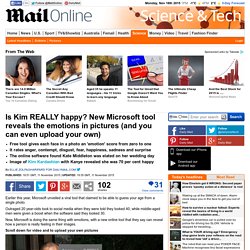
Outraged 20 year-olds took to social media when they were told they looked 40, while middle-aged men were given a boost when the software said they looked 30. Now, Microsoft is doing the same thing with emotions, with a new online tool that they say can reveal how a person is really feeling in their images. Scroll down for video and to upload your own pictures. Blackberry Priv: The final phone in the coffin? We all know the Blackberry story.
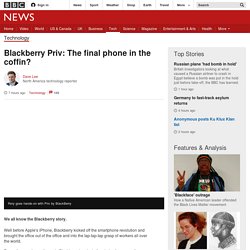
Well before Apple's iPhone, Blackberry kicked off the smartphone revolution and brought the office out of the office and into the tap-tap-tap grasp of workers all over the world. Ease of use and security made Blackberry handsets the choice for corporations everywhere - not to mention world leaders. But the Blackberry went pear-shaped. Unable to keep up in a market of sophisticated phones, with vast app stores and big screens, Blackberry was soon seen as a boring business phone. The firm, once known as Research in Motion, has had one glimmer of hope in recent times: Blackberry Messenger was unexpectedly popular with teenagers, but even BBM - as it was referred to - eventually lost out to Whatsapp and Snapchat as a the teen tool of choice.
Blackberry sales now account for less than 1% of the global smartphone market.